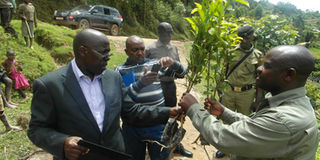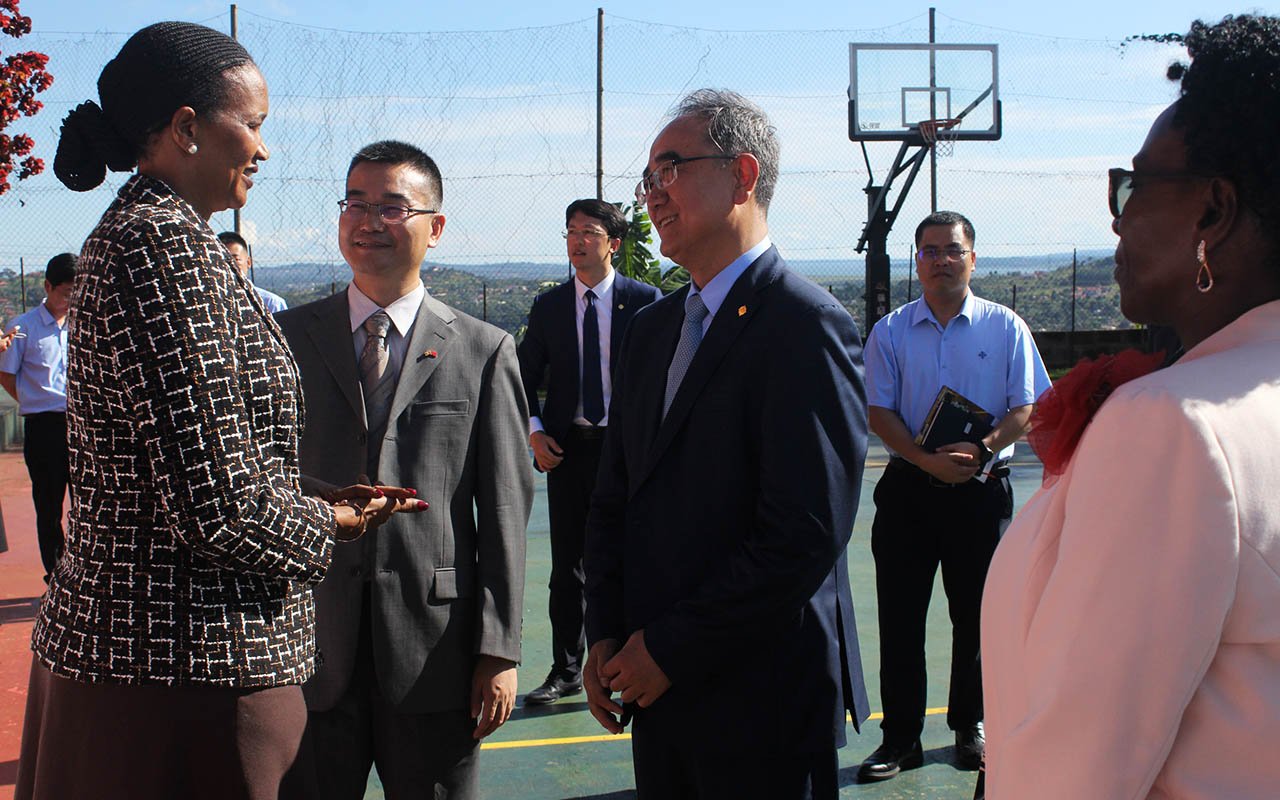Farmers protest verification of seedlings supplied by government

Inspection. Mr Frank Byaruhanga (right), the chairperson of South-Western Tea Nursery Bed Operators and Growers Association, and verification experts examine some of the tea seedlings in Kisoro District in 2016 . PHOTO BY ROBERT MUHEREZA
What you need to know:
The verification exercise aims at establishing the existence of both beneficiaries and nursery bed operators, who claimed to have delivered seedlings to farmers in four districts, for which they are demand compensation.
BUHWEJU/KANUNGU/NTUNGAMO/RUKUNGIRI. Farmers under their umbrella body of Tea Nursery Bed Operators and Growers Association, led by Mr Frank Byaruhanga, have protested a repeated verification exercise of tea seedlings done by Officials from the Ministry of Agriculture, Animal Industry and Fisheries, Operation Wealth Creation (OWC) and National Agriculture and Advisory Services (Naads).
“Those who were verifying worked with the District Internal Security Officer and Gombolola Internal Security Officers forced themselves into the fields, the political and other leaders never participated,” Mr Byaruhanga, who is also the LC5 councillor for Mpungu Sub-county in Kanungu, said.
He said on Monday that it was not proper for Naads to repeat the verification exercise knowing that some of the seedlings were destroyed by the drought that hit the country in 2017.
Officials had concluded the verification exercise of seedlings supplied in Buhweju, Ntungamo, Kanungu and Rukungiri districts in 2016 and 2017 under delegated procurement.
The verification exercise took 19 days and ended on Sunday. The aim was to establish the existence of both beneficiaries and nursery bed operators (suppliers), who claim to have delivered seedlings to farmers in four districts for which they demand about Shs20 billion from government.
“The verification exercise has ended, the team is going come out with a final report,” OWC programme spokesperson, Maj Tabaro Kiconco, said on Monday.
He added: “This exercise will help to weed out ghost claimants, and the fraudsters. It was intended to establish the acreage of the tea fields and traceability of the tea distributed under OWC programme.
“Otherwise the tea enterprise is taking shape with demands of more factories from farmers in Ntungamo and Buhweju districts.”
One team worked in Kanungu and Rukungiri while another worked in Ntungamo and Buhweju. They conducted physical garden visits to verify planted seedlings and used Global Positioning System to determine the planted area.
Similar exercise
However, a similar verification was done in the districts of Kabale, Mitooma, Rubirizi, Bushenyi, Isingiro, Sheema, Rukiga, Rubanda, Mbarara and Kisoro last year.
Maj Tabaro said details of the findings will be in the final report.
Another official who was on the verification team, said Rukungiri and Kanungu districts have less than 50 per cent of the tea claimed to have been supplied in the period.
Naads gave the districts the mandate of procuring suppliers of tea seedlings (delegated procurement).
Districts were supposed to identify nursery bed operators, contract them to supply tea to farmers and verify the tea before Naads pays them.
However, Kanungu District executive members were opposed to the verification exercise. They placed announcements on radios urging the farmers not to cooperate with the verification team.
Ms Josephine Kasya, the LC5 chairperson, argued that the verification exercise was done earlier and Naads had declined to pay the suppliers. She said they had to sue Naads in the Commercial Court in Kampala in July 2018 over the loss.
“We were surprised on April 29, when the officials from the Naads secretariat stormed the district saying they wanted to re-do verification exercise of the planted tea seedlings. We told them that we cannot repeat the exercise because the resolution at the mediation meeting was that Naads pays those who supplied seedlings.
Now that Naads secretariat has opted to breach the mediation resolutions, let the courts of law take over the matter and decide,” Ms Kasya said while addressing farmers at the district headquarters on May 2.
Dr Christopher Bukenya, the head of technical services at the Naads Secretariat, said he had not been briefed by the head of the verification team led by Mr Everest Mulumba.
He, however, added that the findings from the exercise will guide government in paying those who supplied tea seedlings in the tea growing districts in South-Western Uganda.
By ‘certain circumstances’ Dr Bukenya was denoting the fact that suppliers did not have formal contracts with Naads.
He added: “We were guided that despite the circumstances, we need to verify the tea that was planted, we are trying to correct something that went wrong.”
He said though the report has not been compiled, payments will be a process and will still depend on the success of the exercise.
Dr Bukenya added that those who sued Naads might have made an error because they were not duly contracted to supply government.
However, Mr Byaruhanga said independent districts were delegated to handle tea procurement starting from 2008.
He said the farmers had by 2015 grown tea and when leaders and tea stakeholders from South-Western met the President in Gulu the same year, it was agreed that Kanungu, Kisoro, Kabale, Rukungiri, Isingiro and Ntungamo districts get tea factories.
“The President promised that government will allocate Shs220 billion for procurement of tea seedlings to be released in two financial years of 2015/2016 and 2016/2017,” Mr Byaruhanga added.
Failure in payment
Some of the seedlings lost value from nursery beds and while some of those planted got destroyed by the 2017 drought, Naads could not verify and pay for them.
After several efforts to get paid money they injected in the project failed, 717 nursery bed operators (from all tea growing districts in South-Western), in 2018, took Naads to court. Mr Byaruhanga said the matter is in court and the verification exercise was contempt of court.




